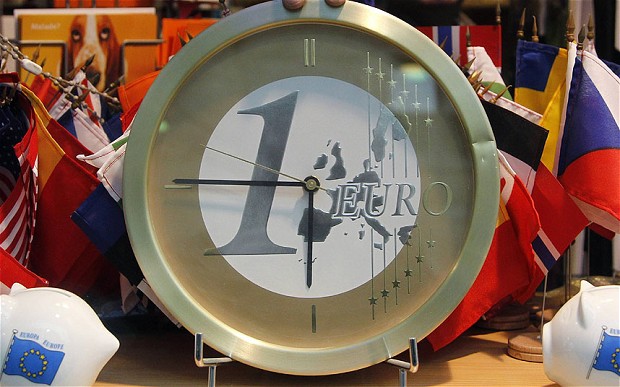The eurozone has relapsed into double-dip recession as the austerity shock in the Mediterranean region spreads to the core countries of the north.
By Ambrose Evans-Pritchard9:13PM GMT 15 Nov 2012
The Dutch economy shrank by 1.1pc in the third quarter amid a deep housing slump, and even Austria has begun to succumb. Finland’s economy has shrunk by 1pc over the last year.
“Recession comes as no surprise and it is going to get worse next year,” said Desmond Supple from Nomura. “Europe has imposed dusted-off policies from the 1930s and they are driving peripheral countries towards depression,” he said.
“We are seeing a mix of pro-cyclical fiscal austerity, overly-tight monetary policy, and regulatory overkill under the Basel III bank rules that are forcing lenders to tighten credit. Europe is stuck in a bad equilibrium and it is not going to end until there is a change of course.”
Prof Paul de Grauwe from the London School of Economics (LSE) said austerity measures imposed on the Club Med with no offsetting stimulus by the creditors was creating a contractionary bias to the whole system and and leading to a “very dangerous situation”.
France managed to stave off recession by the skin of its teeth, but that is unlikely to last after a blizzard of grim data in recent weeks and an austerity shock of 2pc of GDP coming next year.
Howard Archer from IHS Global Insight said the entire core would soon be engulfed. “Germany looks to be in severe danger of contracting in the fourth quarter, as does France,” he said.
Mario Draghi, the European Central Bank’s president, warned Europe’s leaders not to sit on their hands thinking that the ECB has solved the crisis for them with its €1 trillion (£805bn) lending blitz to banks and its pledge to backstop Spain and Italy – once these countries request a rescue and give up fiscal sovereignty.
“We have been able to steady the course. We have gained precious time, but this is not infinite,” he said. The comments were seen as warning to Spain to stop dragging its feet over a bail-out. Belgium’s ECB governor, Luc Coene, was explicit, saying Spain must trigger the mechanism “urgently”. Spanish premier Mariano Rajoy has said he will hold back unless borrowing costs surge to unbearable levels. The mere threat of ECB action has calmed markets enough so far to let Spain cover its funding needs into 2013, but this may be a fragile truce.
On Thursday, Mr Rajoy suspended the eviction of families with children and other vulnerable groups that default on mortgages as an “emergency response” following a suicide that stunned the country, disregarding EU demands for action to clear a backlog of arrears.
The Spanish daily El Confidencial said Mr Rajoy is exploring plans for a rescue from the International Monetary Fund, circumventing the EU altogether – a claim denied by Madrid.
The newspaper said Mr Rajoy and his advisers fear that the German, Dutch, and Finnish parliaments may block a rescue or impose intolerable terms. They also believe that France will be sucked into the maelstrom before long as its own dire problems come the surface, changing the political dynamic in Europe.
Prof Luis Garicano from the LSE said it would be an “outstanding idea” for Spain to break free of EU austerity diktats and seek a neutral umpire. “The IMF has been on the side of reason, whereas the EU has been behaving like a creditor trying to get its money back.”
Prof Garicano said Spain was “betrayed” over the EU bail-out for its banks in July. Mr Rajoy was told the eurozone rescue fund (ESM) would able to clean up Spanish lenders directly once a pan-EMU supervisor was in place, lifting the burden from the Spanish state. Madrid accepted stringent terms on this understanding, only to be told later that “legacy” costs would not in fact be covered.
“There is now a lack of trust. They don’t really believe the EU will deliver on promises. But it is a dangerous game to postpone a full rescue until Spain has already failed,” he said.
Mr Rajoy may have been emboldened after US President Barack Obama said “Spain cannot be allowed to fail”. But diplomats say the IMF would balk at a direct request, seen as a ploy to be playing off Washington against Berlin.
The US, Canada, China, Japan, Brazil and others on the IMF board say Europe has the wealth to sort out its own crisis, which is entirely self-created by the internal mechanisms of EMU.
The Centre for Economic Policy Research said the eurozone has been in continuous recession since the autumn of 2011 using a wide array of output and jobs data tracked by its Business Cycle Dating Committee.
Unemployment has climbed to a euro-era high of 11.6pc for the whole currency bloc, reaching 25.8pc in Spain and 25pc in Greece.
There is no relief in sight. The broad M3 money supply for the eurozone contracted over the last two months and is signalling further trouble next year. The ECB’s latest loan survey showed a collapse in credit demand of almost 50pc in Italy and France.
See online: 1930s medicine pushes Europe back into double-dip recession

